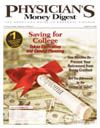Publication
Article
Physician's Money Digest
Protect Your Assets for Future Generations
Author(s):
The concentration of wealth in America ismoving toward an apex as parents of the 80million baby boomers begin to pass away andleave their wealth to their children. Combine thisconcentration of wealth with the litigious nature ofthis country and you have one great reason to consideradvanced strategies to protect the wealth thatyou intend to pass along to your heirs.
Risks When You Pass on Your Estate
Most parents who have wills—though many stilldo not—direct that all of their estate passes outrightto their adult children. If your children are minors, thewill typically states that the estate assets will be heldin trust until the children reach the age of majority,which is age 21 in most states; at that time the assetswill go outright to the children. This strategy, in effect,subjects the parents' assets to the future liability risksof the children. Those risks can come in many forms.First, we live in a world where it is no longer taboo tosue someone. On the contrary, many people take theposition today of "sue first and ask questions later." It has almost become a game of chance, much like thestate lottery. Second, the divorce rate in America continuesto hover around 50%. Think of how distressingit would be to work hard all your life, build up anice estate, which you use to support your retirementyears, and leave the remainder to your children onlyto have much of it lost in a lawsuit or divorce.
Family Legacy Trust
To address this situation, many people are nowchoosing to create a Family Legacy Trust under theirwill. Instead of leaving assets to their children, they createa trust that lasts the lifetime of their children, andyour assets remain in the trust for future generations ofheirs. This trust has the following key advantages:
•Assets in the trust are not subject to the claimsof creditors. If your child is sued, the plaintiff can getyour child's assets, but not the assets of the trust.
•If your child divorces, the trust assets cannot beincluded as part of your child's divisible assets.
•By including special language within yourtrust document, your assets will not be subject toestate taxes upon your child's death; this, however,is subject to limitations.
During your child's lifetime, they will receive all ofthe trust income and can have reasonable access tothe principal of the trust as well. However, as withanything, there are disadvantages of a Family LegacyTrust. Most children prefer to get the money outright.It is only natural for them to want full control,and most people think that lawsuits and divorce areevents that happen to others, not them. But becauseyour assets are at stake, you need to decide if youthink you should protect those assets from very realpotential threats. Also, a trust does require administrationand tax filings, all of which cost money. Butthis price can be well worth the peace of mind thatcomes with knowing that your hard-earned wealthwill be preserved to provide a floor of financial securityfor future generations of heirs.
The Family Legacy Trust is a complex documentand you should seek the assistance of an attorneywho specializes in estate law. One excellent source isthe American College of Trust and Estate Counsel(www.actec.org).
Stewart H.Welch III, CFP®, AEP, is the founder of the Welch Group,LLC, which specializes in providing fee-only wealth managementservices to affluent retirees and health care professionals throughoutthe United States. He is the coauthor of J.K. Lasser's New Rulesfor Estate and Tax Planning (John Wiley & Sons, Inc; 2001). He welcomesquestions or comments at 800-709-7100 or visit www.welchgroup.com.This article was reprinted with permission from the Birmingham Post Herald. Hethanks his partner Scott Lee for his assistance with this article.
